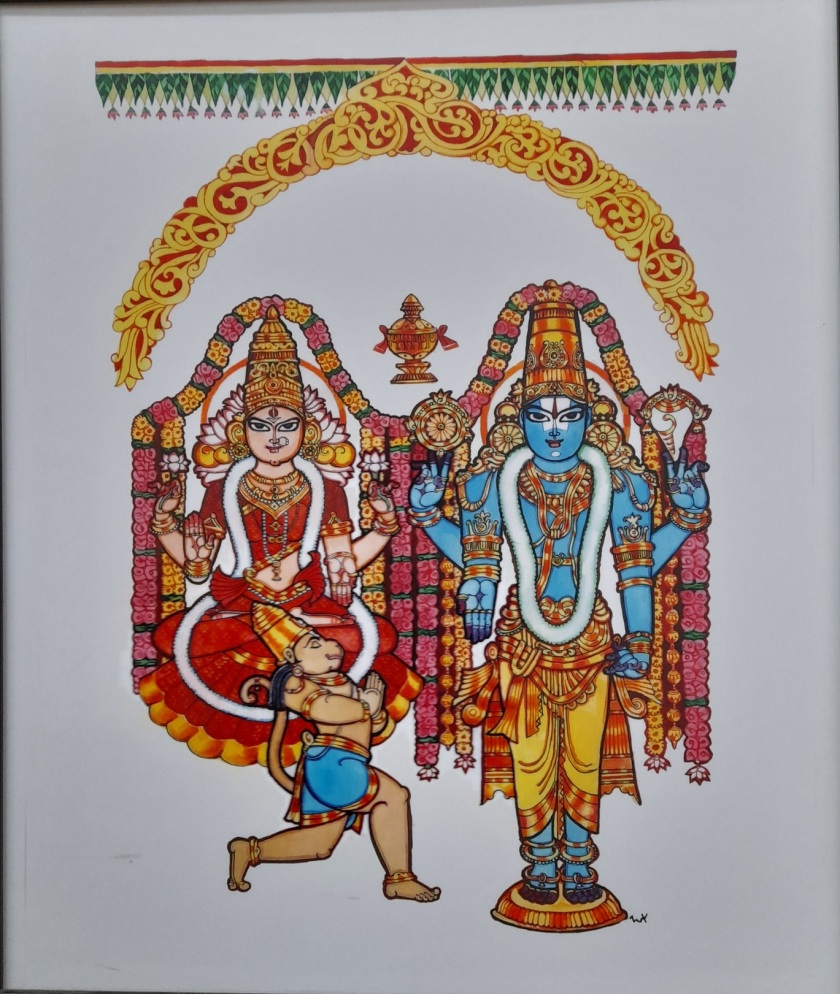The answer is obviously YES. Here’s the context: I’m writing an article on the Āḻvārs’ concept (s?) of God, and need to be very careful not to let the Śrīvaiṣṇava Ācāryas’ interpretations of the Āḻvārs’ words influence my writing. Quite a challenge, especially since I have been precisely working towards understanding the later people’s theological approach to the Tamil poetry for the past few years. Of course, the devout Śrīvaiṣṇavas would say that the Ācāryas interpreted the Āḻvārs’ words just as the latter intended, but well, we can’t know that, right? Besides, Sri APN Swami did say once that the svāpadeśams are entirely an individual’s interpretation of a text. We need more such people who are more open-minded about how we understand certain things. But that’s neither here nor there. I have a few questions because I don’t know if a couple of very attractive ideas found in the Ācāryas’ writings have their origins in the Āḻvār poetry.
First of all: the status of the devotees. While describing how the Āḻvārs were monotheistic, I also need to make allowance for their devotion towards the other devotees. And when it comes to Madhurakavi, that devotee is his teacher. So the Āḻvār poetry also expresses devotion towards other humans, although clearly they are the acceptable sorts (and Tiruppāṇ Āḻvār also states that it is Amalan Himself who made him His devotees’ devotee). Now my question is: the Ācāryas say that worshipping God’s devotees is the same as worshipping His feet, because His devotees represent His feet. Is it something that we can find in the Āḻvār pāsurams? I mean, I do know that the etymology of the word aṭiyavar (devotee) is aṭi (foot). But I would tend to think that the original meaning was that an aṭiyavan is someone who serves at the feet (symbolically and literally) of someone else, not that they become their master’s feet. So, any suggestions from the Divyaprabandham?
The other issue is: Nārāyaṇa’s very identity being associated with His being Śrī-Lakṣmī’s Husband. Of course, the Ācāryas make much of śriyaḥpatitvam, and many also quote Tirumaṅkai Āḻvār’s reference to the other gods as tiruvillā tēvar – gods without Śrī. While this seems evident enough, the word tiru itself has so many other meanings, deriving from śrī: splendour, beauty, auspiciousness (An article that I’ve written about this word is about to be published, so I know a little about this), and of course, later on, Lakṣmī (mentioned in the Śrīsūktam, in the Ṛgvedakhilā). So how do we know that Tirumaṅkai wasn’t thinking of the other qualities when stating that only Nārāyaṇa has it, and not the other gods, and therefore, He is God, not the others? If you see what I mean. I need to answer such pūrvapakṣam without referring to the Ācāryas’ works. Any thoughts about this?
I also think that Śrī is very much part of Nārāyaṇa in the Divyaprabandham and does not receive praise separately nor does She emerge as a separate object of worship. Any verses that hint at the opposite?


I am curious to know if you learned any Thayar-centric pasurams since you wrote this post.
As a lay Sri Vaishnava I’ve only had the fortune of studying a small fraction of Dhivya Prabandham, but I’ve often wondered why references to Thayar are so cursory and usually emphasize her sheshatvam to Perumal.
It contrasts with Mahadesikan’s stutis and later Vadagalai/Thengalai debate on Thayar as a separate atma that is on par with Perumal. Even when Her dependence on Narayana is maintained it is usually emphasized as being by Her own volition, and many modern-day Sri Vaishnava families (including mine) emphasize sevai to Her before that of Perumal due to Her saulabhyam. Do you have any insight how/why Thayar has been elevated in modern Sri Vaishnavism?
(By the way, I am Máire’s friend, which is how I found your blog).
LikeLike
Hi, Unfortunately, I haven’t. For Tamil verses on Thayar, we need to look into Acharya poetry, in sanskrit of course, but also in Tamil. Swami Desikan’s Mummanikkovai, for example, does focus on Her quite a bit. It seems like a second-millennium phenomenon to me. “Do you have any insight how/why Thayar has been elevated in modern Sri Vaishnavism?” : this involves a complex answer. I might write something later on on this topic.
LikeLike